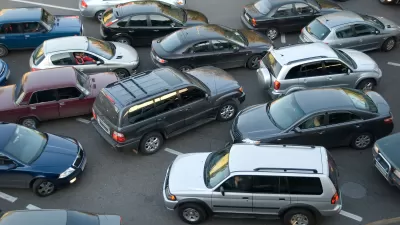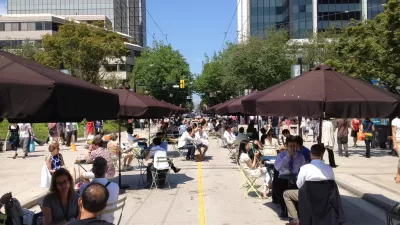Traffic

What Causes Traffic?
You're probably thinking "Way too many cars on the road, duh!" But the real answer is a bit more complicated, and counterintuitive. Tom Vanderbilt explains in a 20-minute presentation.
Bike and Pedestrian Improvements Boost Vehicle Speeds in NYC
New data from New York's Transportation Department shows that although miles of Manhattan street space have been turned over to bikes and pedestrians since 2008, average traffic speeds have actually increased, despite a consistent volume of vehicles.
Play Dismay: Traffic and the Epidemic of Cloistered Children
Sarah Goodyear examines the connection between the way we design our streets and the reluctance of parents to let their children play outdoors.

How Did Vancouver Decrease its Traffic While Growing its Population?
With its elegant skyline, walkable streets and stunning parks, Vancouver exemplifies great city-making. Add to the list of achievements the city's ability to reduce traffic by 20 to 30 percent since 2006 while growing its population by 4.5 percent.
Westside Fights Smart Growth: Can Any Development Navigate L.A.'s Traffic Nightmare?
On the Westside of L.A., where rush hour traffic slows to a crawl on the best days, a proposed transit-oriented development called the 'quintessential example' of smart growth by the Mayor's staff faces opposition to its size and attraction to autos.
"Bike Breaks" Leverage Dynamic Resources for Synergistic Efficiency Improvements (they really do!)
Using bicycle racks as partitions in lieu of fences, called "bike breaks", in heavily trafficked areas accomplishes two goals at once and fends off the design wonks.
D.C. Mustn't Look Far to Find Lessons for Reducing the Nation's Worst Congestion
Washington D.C. holds the dubious distinction as the nation's most congested city. As D.C. seeks ways to reduce its traffic, Arlington County, in suburban Virginia, has made great strides in convincing commuters to ditch their cars.
Better Traffic Flow Is a Two-Way Street
Cities such as Dallas, Denver, Sacramento and Tampa are reversing course on their one-way streets for a number of reasons; but improving traffic flow likely isn't one of them. Eric Jaffe looks at a recent study that upends conventional wisdom.
A Simple Solution to Kabul's Massive Traffic Problem
The proposal is simple. Instead of investing billions of dollars more on elaborate infrastructure or trust a corrupted police force, the concept is to nudge this complex system at two targeted points in the city, argues Mitchell Sutika Sipus.
Can Narrow Lanes Improve Traffic Congestion?
Comparing wide versus narrow lanes, Kenneth A. Small and Chen Feng Ng examine the relatively unexplored design of building more compact roads to alleviate traffic congestion.
Why Public Spaces Are Crucial for 'the Future of the Human Race'
Jay Walljasper chronicles the decline of lively public spaces in the era of "rampant traffic, proliferating privatization, heightened security...and the internet," and human kind's existential need for protecting and expanding the public realm.
NYC's Taxis Offer Rare Insights into City Driving Patterns
With New York's fleet of more than 13,000 taxi cabs transmitting Global Positioning System (GPS) data, the city's Department of Transportation has been able to develop a highly detailed picture of traffic patterns in the Big Apple.
Chinese Cities are Huge, But What's it Like to Live There?
We get it, China's cities are big and getting bigger. But what's it like to live there? Isaac Stone Fish takes a closer look at the quality of life in Chinese cities, and finds them almost uniformly monolithic and unlivable.
Where are the Worst Friday Commutes?
Your boss might be interested in this article, which makes the case for working extra long on Fridays to avoid what, in nearly three-quarters of metros across America, is the worst time of the week to drive. Mike Maciag looks at the worst offenders.
Can't All Modes Just Get Along?
In the face of New York City's increasing assault on automobiles, Justin Davidson stands up for the pleasures and utility of driving as a key ingredient in the city's multimodal mix of mobility.
Egypt's Social Media Takes On New Foe: Cairo's Traffic
After aiding in the dissolution of Egypt's authoritarian regime, social media is being enlisted to tackle a more formidable obstacle: easing its capital city's traffic, reports Noel King.
Parking Minimums Beleaguer a Car-Choked Brazil
Stephen Smith takes a look at land use regulations in Brazil, where developers are still required to make room for cars that its growing cities can't support.
Train Times to Accompany Motorists Stuck in Traffic
To encourage train ridership, Caltrans and Metrolink have teamed up to display train times on electronic signs along two oft-congested Southern California freeways.
What Would Happen If All Public Transportation Stopped?
The Texas Transportation Institute (TTI) released its 2011 Urban Mobility Report, which shows how many additional hours in traffic each commuter would be subject to if public transportation were discontinued.
Smaller Can Be Better When it Comes to Traffic Solutions
With the worst traffic in the country (see previous story), Washington has big problems. But Stewart Schwartz suggests that big problems don't necessarily call for big solutions.
Pagination
Urban Design for Planners 1: Software Tools
This six-course series explores essential urban design concepts using open source software and equips planners with the tools they need to participate fully in the urban design process.
Planning for Universal Design
Learn the tools for implementing Universal Design in planning regulations.
Smith Gee Studio
City of Charlotte
City of Camden Redevelopment Agency
City of Astoria
Transportation Research & Education Center (TREC) at Portland State University
US High Speed Rail Association
City of Camden Redevelopment Agency
Municipality of Princeton (NJ)


































